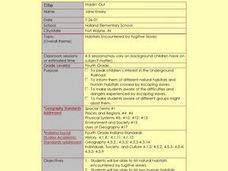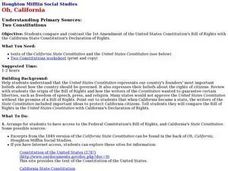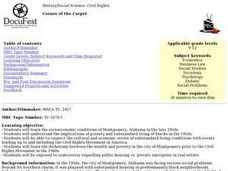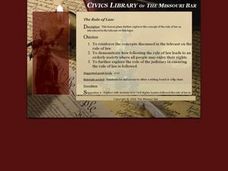Curated OER
One Person's Trash: Breaking it down
Students research how trash is disposed of and make an edible landfill. In this trash lesson plan, students research proper trash disposal, and discuss how trash affects the community. Then they make an edible landfill.
Curated OER
Divided We Fall
Students examine the Bill of Rights. In this U.S. Constitution lesson, students write essays for perform plays that feature the importance of the first ten amendments. Students imagine the United States without 1 of the amendments that...
Curated OER
Lesson Plan: Early Political Parties
Pupils examine the platforms of early political parties in the United States. In this political parties lesson, students discover details regarding the attributes and ideals of the federalists and the democratic-republicans. Pupils...
Curated OER
Tin Can Sculpture
Students create art from recycled materials. In this visual arts lesson, students follow the provided steps to create their own tin can artwork.
Curated OER
Teaching With Documents Lesson Plan: Photographs of Lewis Hine: Documentation of Child Labor
Students interpret historical evidence presented in primary and secondary resources. In this child labor lesson, students examine photograhs by Lewis Hines and discuss the implications of child labor in America.
Curated OER
Perseverance and the First Amendment
Students investigate the right to petition and assemble. For this Bill of Rights lesson, students read the First Amendment and discuss the rights guaranteed by the amendment. Students research selected groups and movements that have...
Curated OER
The Art of Nonviolence: Martin Luther King, Jr., Gandhi, and Concepts of Nonviolence in Indian Art
Students make connections between nonviolent ideals and art. In this visual arts lesson, students discuss the successes of the American Civil Rights Movement and discuss Gandhi's influence on the movement. Students then examine images of...
Curated OER
Vietnam: Lesson 4
Students take a closer look at war memorials. In this Vietnam lesson, students research the Vietnam War Memorial and then visit the memorial. As a culminating activity, students research other war memorials.
Curated OER
Reformation and Civil Wars of Religion in 16th Century France
Students discover details about the Reformation. In this French history lesson, students view a PowerPoint presentation about the religious wars that took place in the country and within Europe. Students take notes on the presentation...
Curated OER
American Industry Growth
Eleventh graders explore the economic growth from 1878 to 1893. In this social studies instructional activity, 11th graders discuss how the improvements lead to an inequality in wealth and the problems that it caused.
Curated OER
Dalai Lama
In this famous person learning exercise, students read a passage about the Dalai Lama and then complete a variety of in-class and homework activities to support comprehension, including partner interviews, spelling, cloze,...
Curated OER
The War Lesson Plan
Students view video clips of the film "The War". Several classroom activities are included and address major themes found in the film. The lessons incorporate video clips from the film as well as additional resources provided.
Curated OER
Alan Johnston Freed
Students are asked to imagine what they would miss most if they were ever in prison or kidnapped. They work in small groups and match the vocabulary with the definitions. Students are told that they are going to read about a kidnapping...
Curated OER
Journalists Under Fire
Students research current events in relation to the United States military. In this current event lesson, students find out what is going on in the war and use what they find to explain and debate their stance on current events.
Curated OER
Silent Signals
Third graders discuss the frustrations of navigating the Underground Railroad and list the symbols and signs used to communicate on the Underground Railroad.
Curated OER
Hidin' Out
Fourth graders draw three major Underground Railroad routes crossing Indiana on an outline map and include habitats and towns. They produce an oral history involving at least three natural habitats and one human habitat.
Curated OER
Two Constitutions
Fourth graders participate in a teacher-lead discussion about the United States Constitution and the California State Constitution. They compare the Bill of Rights in the United States Constitution with Califonia's Declaration of...
Curated OER
Corner of the Carpet
Students examine the socioeconomic conditions in Montgomery, Alabama in the late 1950's including the poverty and living condition of the blacks during this time by watching a documentary. They determine how these living conditions lead...
Curated OER
Aspects of Participatory Citizenship
Students research the current issues about the government of Canada and develop their presentation skills.
Curated OER
Civics: The Rule of Law
Students examine key concepts pertaining to the rule of law. They explore how Civil Rights leaders such as Martin Luther King, Jr. used it to oppose discrimination practices. They examine Supreme Court decisions demonstrating the...
Curated OER
Don't Let Your Rights Be Violated
Ninth graders engage in a study of the First Amendment of The Constitution. They read the amendment and use a highlighter to note the important parts. Then students journal the connections of its importance to daily life. They include...
Curated OER
Leaders in Journalism
Students examine the changing leadership roles and qualities of writers, journalists and editors in public life. They view short video clips by prominent journalists and read about various journalists in history.
Curated OER
The United Nations and Women
Learners analyze the role of the Commission on the Status of Women in the post-WW II era by looking at the general framework the Committee worked within. They propose their own solutions to the case studies.
Curated OER
Why Burn Books?
Students identify the role of free speech in the selection of library books. They choose one banned book to read and evaluate the reason for its censorship. They create an argument for or against the selection of the book.

























